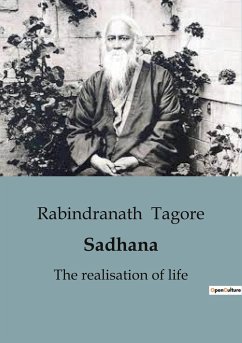Embark on a spiritual journey with Rabindranath Tagore's "Sadhana," a collection of profound essays that delve into the understanding of self-realization, inner growth, and spiritual enlightenment. As a seminal work by the Nobel laureate, "Sadhana" draws from Tagore's profound understanding of the Vedantic and Upanishadic teachings to offer insights into the essence of human existence. "Sadhana," which translates to "spiritual practice," encapsulates Tagore's exploration of the journey of spiritual awakening and the individual's relationship with the universe. The book intricately weaves themes of love, humanity, and unity with the cosmos, advocating a sense of interconnectedness and oneness that transcends religious boundaries. With its thought-provoking discussions on concepts like the manifestation of the divine in everyday life, and the infinite within the finite, "Sadhana" invites readers to introspect, to explore their inner selves, and to aspire towards a higher state of consciousness. It proposes that true enlightenment and fulfillment come not from material possessions, but from understanding and embracing the infinite expanse of the cosmos within one's own soul. "Sadhana" is more than just a book; it is a spiritual guide for those seeking to understand the profound depths of their existence and their purpose in the universe. It invites the reader to look beyond the constraints of their physical existence and embark on a path of spiritual enlightenment. " Perhaps it is well for me to explain that the subject-matter of the papers published in this book has not been philosophically treated, nor has it been approached from the scholar's point of view. The writer has been brought up in a family where texts of the Upanishads are used in daily worship; and he has had before him the example of his father, who lived his long life in the closest communion with God, while not neglecting his duties to the world, or allowing his keen interest in all human affairs to suffer any abatement. So in these papers, it may be hoped, western readers will have an opportunity of coming into touch with the ancient spirit of India as revealed in our sacred texts and manifested in the life of today."
Hinweis: Dieser Artikel kann nur an eine deutsche Lieferadresse ausgeliefert werden.
Hinweis: Dieser Artikel kann nur an eine deutsche Lieferadresse ausgeliefert werden.








